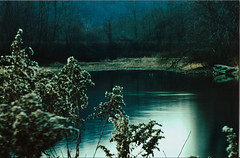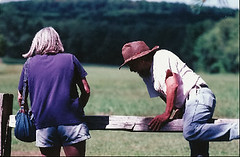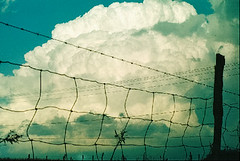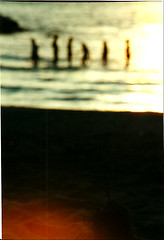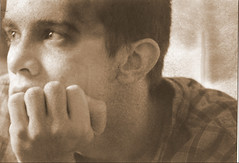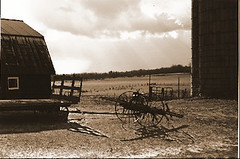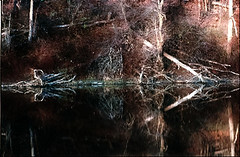Friendly City in the Land of the Free What's the hardest part of making a documentary film in Pittsburgh? "Getting people to call you back, getting people to trust you," responds Pittsburgh filmmaker Chris Ivey of Hyperboy Media. "Getting people to take you seriously. But mainly trust. And support." The premiere of the first leg of his urban renewal triptych East of Liberty: A Story of Good Intentions come and gone in December 2006 at East Liberty's renovated Kelly-Strayhorn Theatre – and with the second, third and fourth showings also fading notches on his belt – Ivey glows as he talks about the various interviews that are keeping him busy and one panel discussion that really energized and excited him. Then he rolls his eyes.
An altercation broke out shortly after the Hill House screening in Pittsburgh's historic and controversial Hill District, when one member of a group of black, Muslim males made an offensive remark to a group of black lesbians. Although enthused about the sparked Q&A session that the film had elicited, the young filmmaker shakes his head as he recalls the incident. When the group tried to smooth things over by saying that he had meant no offense the lesbians, said Ivey, "weren't having any of it." The Muslim faith provides no leeway for acceptance of sexual orientation, nor does the black community in general, he confirms, shrugging. "It's a sin."
Similar conflicts pepper the ongoing spectrum of Q&A sessions that accompany each showing, and Ivey's enlightening film continues to engage a cross-section of people of various races, most of whom happen to live in an area doomed to be repopulated and possibly even renamed "The East Side" as a consolidated neighborhood, losing its distinctiveness. At the first showing, when he announced the follow-up leg and its focus on black-on-black violence, one audience member fumed, upset that white-on-black or even white-on-white violence was not being addressed. "I told her that I understand where she was coming from, but it was important to me to address that if I knew someone who was a victim of white crime, I would address that – but what I've been seeing is black-on-black violence exploding – and I wanted to address that."
The thirty-four-year-old Hyperboy Media founder has been living in Pittsburgh since 1995, his personal MySpace page sporting an old wound proudly, like a Purple Heart, as it declares his hometown to be "Monroe, NC…Same town as that damn Jesse Helms." His awareness of black history in Pittsburgh is up to snuff, though, as he talks about watching another documentary about East Liberty in contrast to the one on PBS. "That's the nice one," he smiles as he sits back into a chair at the Southside's Gypsy Café. Friends with the owner and nearly everyone employed there, Ivey looks incongruously at home in décor he describes as "old-school romantic," pausing to consider one of the many modern art works that incorporate old world iconic images of the Madonna and Christ.
Somehow, the renovated Greek Orthodox Church setting suits him.
For two years, the high school and Pittsburgh Filmmakers-educated filmmaker has been working on a PBS documentary about the consequences of AIDS in the African-American society at large. It reminds him of a lot of the woes entrenching an entire race, both in reality and in the media. He recalls a TV show that surfaced at the tail end of the Cosby years, Under One Roof, which included appearances by Joe Morton and James Earl Jones. "It was a really good show, and it only lasted a month," Ivey laments. "One thing from the black community is that you never see any positive images portraying black people in a strong way. It's either comedic, music or sports. It's never anything enlightening." After two years of interviews mainly set up by the AIDS documentary's Connecticut producers, Ivey's no stranger to African-Americans' lack of acknowledgment, which he pinpoints in a word: "Shame. If someone dies of AIDS, [the family] is likely to say it's cancer."
The staggering difference between the gay community's early-1980s response to AIDS and HIV awareness and that of the black community weighs on him, too. "Not many people [in the community] care that the African-American community is number one for AIDS. People only choose what affects them. If it doesn't affect them directly, they don't get involved. I think that goes for everybody, but it goes double in the black community." Those words manifested themselves with the culmination of the first part of his film, which witnesses the destruction of the East Mall Tower, an over-the-street apartment building that once signaled the entryway to East Liberty on Penn Avenue as surely as the Gateway Arch heralds the West. Ivey recalls the building's former residents in plaintive tones. "From the mid-90s until 2 years ago, you could turn on almost any news broadcast and if it mentioned East Liberty, either somebody got shot or something."
Because of the media connection of the East Mall Tower with violence and drugs, the city government made a field day of the building's demise, turning the event into a paintball free-for-all as the inhabitants of the building looked on in stupefied horror and fascination and an entire community repressed mixed feelings too diverse to list. Despite that – or, perhaps, because of that kind of trauma – Ivey had difficulties locating support nerves in the community. "If certain [city officials] felt like the direction of certain things weren't going the way that they thought they would, phone calls would slow down and maybe take a month. And they assumed the worst of the project, like the worst was going to happen and make them look bad."
When waiting for calls to inbound ceased to be a virtue, Ivey took action and went after the foundations himself. A pre-established relationship of sorts from a different project with the Multi-Cultural Arts Initiative helped significantly, as did partnering with other organizations like the Pittsburgh Foundation. "It's kind of funny the way that I saw things a certain way, and the foundations got it, but the development companies saw something different," Ivey reminisces. He had an easier time finding people to talk to him who were hacking out a living on their own, pooling a variety of perspectives to concoct the film.
Two of the documentary's featured interviewees, married couple Ebony McKinney and Davu Flint, hold a role integral to the film's evolution, something that Ivey's waiting to unveil in the second leg set to premiere in September. "[Ebony] pointed it out well when she said that people hear what they want to hear." Learning how to grab people by the ears may have been a critical lesson to him during the documentary process, but reaching people beyond the point of hearing what they want to hear interests Ivey more. "I love being able to create things and express my thoughts and, maybe, entertain and enlighten people. Make people talk, make people dance, and occasionally make people talk back to the TV," Ivey laughs. "I like that a lot."
East Liberty has undergone enough changes in the last few years to keep people talking to their TVs indefinitely, if for no other reason than to bide time while awaiting the arrival of more catapulting paint and a wrecking ball just outside their doors. Changes like signs sporting the greeting, "Welcome to the East Side," the rapid growth of corporate stores that have ousted small businesses through skyrocketing rent payments and the arrival of strange architecture make it denizens leery.
One such oddity exists at what is now an architectural firm on the corner of Whitfield and Baum. The renovation of the building included two massive wooden doors that one morning attracted a crowd of spectators. It wasn't the light coloring of the doors that had pulled people from the East Liberty branch of the Carnegie Library, though. It was the doorknob, a steering wheel-size sculpture of a bronze man climbing the doors in a loincloth. In order to open the door, a brave soul has to tug on the sculpture's tummy. One African-American library employee seemed especially alienated and turned off by the hardware seemingly placed to fit in to the urban landscape. Before trudging back to work, she managed to mutter, "Well, they're never building anything for me."
Such complacency is pretty much par for the course in East Liberty. Changes are made and people rubberneck without really getting involved. That's where Ivey comes in, exciting people and waking them up. But he also likes the easy sense of brotherhood that exists among most African-Americans, mentioning the understanding that when you see someone on the street, you greet them. He sees this as a good thing, a positive affirmation among blacks. "That doesn't fly in London, though," he smiles. East of Liberty pond hops to a similar neighborhood for a May 7th screening in Hackney, and Ivey will be riding shotgun because gentrification, like poverty, is universal.
Continuing his work state-side, Ivey plans to hang out with kids in different neighborhoods most of the summer. This stage feels of monumental importance to him because it addresses the key issue of gang violence in the city as well as the growth of the black community. Money is also easier now that the first stage has been completed and the foundations are pleased with the progress, Ivey reports, along with a nagging feeling of irony that the project's bane has now become a source of contention. Everyone wants to be a part of it now that the hard part's over, and that frustrates him. "What does it really take for people to really see?" Ivey asks of the air. "It's like making this documentary into a court case, like you have no proof or disproof that this is really happening. If I hadn't documented it, nobody would really care. Nobody wants to talk about failure. Nobody likes to deal with failure. They want to move on. You can't just forget shit."
Spending time with kids rather than adults this summer may be a refreshing change of pace for Ivey, whose frustrations with the broken lines of communication may take a while to die down. He's tired of subservience, appalled at the absence of authority questioning. "Everybody's afraid. They're either living like a citizen or an evil-doer or just a…poopie-head," he laughs, a director already geared to deal with his new subjects.
The second leg of East of Liberty will air at various venues starting this Fall, including The Kelly-Strayhorn Theatre, The Hill House and The Union Project. Each screening is followed by a Q&A session. To get involved, all you have to do is show up.
For more information, visit eastofliberty.com or email Chris Ivey at hyerboymedia@gmail.com.
Labels: Chris Ivey, Documentary, East of Liberty, Indie Filmmaking

